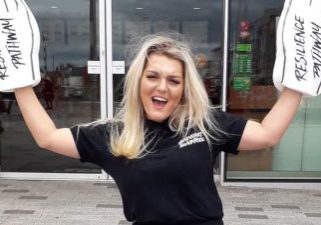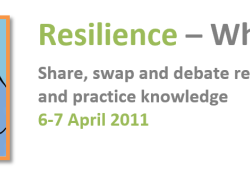Topic: Creative Resilience: Story-led creative approaches to using the Resilience Framework – Celine Wyatt and Jo Cleasby from the Grand Theatre Blackpool
Resources: You can download the forum slides.
Session Summary: Story-Led Resilient Therapy Practice has been developed and piloted by Celine Wyatt and her team at the Grand Theatre Blackpool (external link) over the past two years. The Grand is committed to being part of the town-wide Resilience Revolution led by HeadStart. This approach and practice looks at stories presented on the stage through a resilience lens and is central now to programme development and delivery for children and young people. The Resilience Framework and the focus on systems change has transformed the way in which the Grand thinks about its programme rationale. This integrative practice is being used particularly in the Grand Junior Artists After School Programme, where we see resilience in action through a range of inclusive arts practices. This presentation will provide an overview of the Story-Led Resilience Therapy Practice.
Biography: Celine Wyatt is Head of Creative Learning at the Grand Theatre in Blackpool. She has a BA (Hons) in English and Drama with a Certificate in Education. Celine currently sits on the Royal Shakespeare Company (RSC) Education Advisory Panel and the Edge Hill University Employability Panel.
Celine has worked in theatre, cultural and education sectors and has had positions as a Teacher, Arts Officer, Youth Worker, Schools Cultural Development Officer and Creative Learning Director. She is a Royal Society of Arts Fellow, a Common Purpose Graduate, a Trustee of Zest Academy Trust, a Member of the Royal Society of Arts Evidence Champions Network, a Member of the Member Cultural Learning Alliance, an Arts Award Adviser and a Resilient Trainer.
Celine is committed to enabling children and young people to build their capacity and resilience through creative experiences and processes.
Jo Cleasby is a Creative Learning Producer at the Grand Theatre in Blackpool. She has a BA (Hons) and a Post Graduate Certificate in Education (PGCE) from Cambridge University and a Post Graduate Award in Creative Approaches to Teaching Shakespeare. Jo is a Royal Shakespeare Company Theatre Practitioner and leads the Blackpool, Fylde and Wyre Associate Schools Programme. She is a Mentor for the NW SLICE programme (Specialist Leaders in Cultural Education), an Arts Award Adviser, Assessor for Historic England (Heritage Schools Award) and a Resilient Practitioner.
Who might be most interested: Academics, practitioners, researchers, students, parents, carers, community workers, volunteers, public sector workers, young people, service users and people with lived experience of mental health problems.
Further Reading:
- The Hero with a Thousand Faces: Joseph Campbell (1949 1st Ed) Princeton University Press
- Drama for Learning: Dorothy Heathcote’s Mantle of the Expert Approach to Education: Dorothy Heathcote (1995) Person Education Press.
- Theatre of the Oppressed: Augusto Boal, Charles A McBride (1993) first published Jan 1st 1977
- Making Sense of Drama, A Guide to Classroom Practice, Jonothan Neelands (1985)
- Structuring Drama Work: A Handbook of Available Forms in Theatre and Drama (1990) Cambridge University Press
- Out of Our Minds: Learning to be Creative: Ken Robinson, (2011) john Wiley & sons pub.
- Creative Schools: Ken Robinson and Lou Aronica (3 March2016) Penguin Books Ltd
- Resilient Therapy, Working with Children and Families; Angie Hart and Dereck Blincow with Helen Thomas 2007) Routledge
- The Resilience Framework ( Children & Young people) Oct 2012-adapted from Hart & Blincow (2007)
- Sharp, C. and Lee, B. (2015) Using Quality Principles in Work for, by, and with Children and Young People: Results of a Pilot Study (Draft Final Report). Slough: NFER.
- Imagine Nation: The case for Cultural Learning: Key Findings (2011) The Cultural Learning Alliance
- Imagine Nation: The value of Cultural Learning: Key Findings (2017) The Cultural Learning Alliance.
- Understanding the impact of engagement in culture and sport (CASE 2010)
- Creating Better Outcomes for Children and Young People by improving the Commissioning of Cultural Services : I&DEA (2009)
- Learning, Creative Approaches that Raise Standards, Ofsted (2010)
- Enriching Britain: Culture, Creativity and Growth; The 2015 Report by the Warwick Commission on the Future of Cultural Value.
- Arts for Health and Well-Being: An evaluation framework: Public Health England (Feb 2016)
Key Websites:
- The Cultural Learning Alliance (external link)
- Culture Case (external link)
- RSA, Action Research Centre, Learning About Culture (external link)
- The Arts Council (external link)
- The RSC (external link)
If you like what you see and you want more, More, MORE, why not subscribe to our mailing list? You’ll receive our email newsletter with details of our upcoming Resilience Forums, training and other events, news and resources (most of which are free!), and any other products and services that might be of interest. This is a web-based service and it is very easy to subscribe, unsubscribe or update your email address at any time.
Sign up here.
This event took place on Friday 22nd February 2019.
The Resilience Forum is for ANYBODY (with a pulse!) involved with or interested in resilience research


